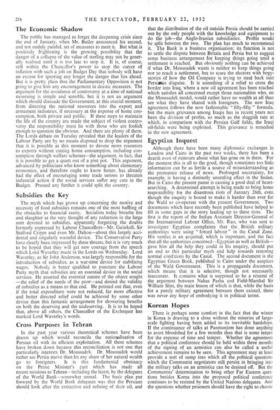Egyptian Inquest
Although there have been many diplomatic exchanges in London and Cairo in the past two weeks, there has been a dearth even of rumours about what has gone on in them. For the moment this is all to the good, though sometimes too little information can be as fertile a source of misunderstanding as the premature release of news. Prolonged uncertainty, for example, is having a. distinctly unsettling effect in the Sudan. But in Cairo the present pause is causing a good deal of heart- searching. A determined attempt is being made to bring home responsibility for the disastrous riots of January 26th, even though the enquiry is bound to make it harder than ever for the Wafd to co-operate with the present Government. Two documents which have recently been published have helped to fill in some gaps in the story leading up to these riots. The first is the report of the Indian Assistant Director-General of the International Labour Office, Mr. Rao, who was sent to investigate Egyptian complaints that the, British military authorities were using " forced labour " in the Canal Zone. His verdict is an acquittal, which is important, and the fact that all the authorities concerned—Egyptian as well as British— gave him all the help they could in his enquiry, should put an end to this particular myth and help towards restoring normal conditions by the Canal. The second document is the Egyptian Green Book, published in Cairo under the auspices of the Wafd Government. This is a propaganda document, which means that it is selective, though not necessarily inaccurate. It contains what is supposed to be a résumé of the argument between Nahas Pasha and Field-Marshal Sir William Slim, the main lesson of which is that, while the basis for a purely military_ agreement between them existed, there was never any hope of embodying it in political terms.


































 Previous page
Previous page